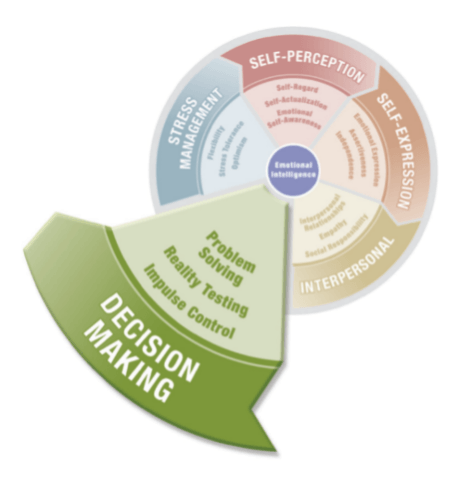No Regrets: Using Emotional Intelligence to Improve Decision Making
Tammie Beck • May 18, 2022

Whenever you see a successful business, someone once made a courageous decision.
- Peter Drucker
Decision Making is an essential part of being an effective leader. We use decision making skills to achieve performance goals, manage and align workloads, build trust and rapport, communicate, reduce conflict, manage time, and engage employees.
Our emotions can be a strong influence in our decision making-having strong Emotional Intelligence skills drives our ability to make optimal and timely decisions. A leader that has strong decision-making skills can realistically and objectively examine situations, formulate effective solutions, and implement change while preserving relationships.
The EQ Edge by Steven Stein and Howard Book outline three key skills that impact our overall decision-making ability:
Reality Testing:
Reality Testing describes a leader’s ability to see situations objectively, not the way they wish or fear them to be. Reality Testing is critical in decision making because it enables the leader to understand root causes and opportunities. Leaders can use their Reality Testing ability to measure and understand the work climate and respond appropriately.
Problem Solving:
Leaders with strong problem-solving skills understand how emotions impact decision making. They have learned to approach problems in a systematic and objective way by following six steps:
- Examine the Problem: Analyze the problem in an accurate and objective way (use Reality Testing Skills).
- Brainstorm Alternatives: Think of all options that can solve the problem.
- Evaluate Alternatives: Without bias, carefully review each option to determine the best solution.
- Choose the Best Option: Trust your process and confidently accept the solution. Few solutions come with a guarantee- own the risk.
- Implement the Solution: Resist the temptation to focus on the what ifs. Trust your process and implement the solution-adjusting if you need to.
- Assess the Outcome: Determine if the solution has worked. If not, re-evaluate the problem and choose another alternative.
Impulse Control:
Leaders who are strong in impulse control can resist the temptation of acting in a rash manner. This helps avoid the perception of being aggressive, unpredictable, impulsive, and hot- headed.
How would you rate yourself on the following statements? Your answers may be an indicator of your need to improve your decision-making skills.
- I often leap before I look.
- People describe me as impatient.
- I am sometimes annoyed by how long it takes others to make up their mind.
- People describe me as hot tempered.
- Sometimes I make decisions I regret.
Emotional Intelligence skills have been found to be directly responsible for between 27 and 45 percent of job success, depending on which field was under study1. Organizations that focus efforts on the development of these skills have seen positive ROI in the areas of engagement, turnover, productivity, and more.
Center Point Solutions offers certified Emotional Intelligence coaching and training. Reach out
today for more information on how we can help strengthen these skills in your organization.

Sources:
1. The EQ Edge: Emotional Intelligence and Your Success: Steven J. Stein, PH.D. and Howard W. Book, M.D.

Emotional Intelligence (EI) can be defined as a set of emotional and social skills that influence the way we: Perceive and express ourselves. Develop and maintain social relationships. Cope with challenges. Use Emotional Information in an effective way. EI is a key indicator of human performance and development potential, which can be improved and developed with practice. The first step in developing an improvement plan is to accurately assess your current performance level. The EQ-i 2.0 is a scientifically validated and reliable assessment that has been used for decades to accurately measure an individual's emotional intelligence. The results of this assessment can be used to provide insight into current performance gaps and recommendations for performance improvement. The EQ-i 2.0 features one overarching EI score (total EI) broken down into five composite scores, which measure five distinct aspects of emotional and social functioning. These in turn, are broken down into a total of 15 subscales.

It started out like any other day. I arrived early at the office hoping to get a jump start on my long to- do list. As with any normal day, you can never predict the unscheduled events that will pop up. Today I was notified that a long-term employee in the hospital had received a devastating terminable diagnosis. I set my to-do list aside and my focus turned toward assisting the family in their time of need. It turned out this employee, although in pain and feeling very sick, was worried about one thing: She was only weeks away from celebrating her 35th work anniversary and she was worried that she wouldn’t be out of the hospital in time to receive her 35-year anniversary pin. Knowing how important this was to her, the Leadership team immediately sprang into action, and we arranged to have her service award ceremony at the hospital as soon as possible. Later that day, with her family by her bedside, her leadership team was able to present her service award pin to her. Her pin was proudly attached to her hospital gown and her framed certificate was on the stand next to her bed. Although she was unable to speak, the smile on her face told us how much the moment meant to her. Sadly, she passed away three days later.

In August 2021 more than four million workers quit their jobs 7 . Since that time, the Great Resignation has been on the minds of many organizations. Although it is impossible to predict all the factors that contribute to a phenomenon like the Great Resignation, there are valuable lessons that we can learn. Workforce 2030 models estimate that by the year 2030 the United States will see an estimated increase of 11.9 million new jobs and only 8.9 million new entrants to the workforce. 6 The Great Resignation is not anticipated to end soon; in fact, estimates show that 36% of Millennials and 53% of Generation Z will leave their current employer within two years 4 . Organizations that fail to strategically plan for the continuing evolution of the workforce will likely suffer. Organizations will increase their chances for success if they educate themselves and prepare for the implications that the changing workforce will have on their organization. Developing a workforce vision that accounts for the impacts of the below trends will help organizations succeed.

Empathy is sometimes referred to as our sixth sense. It is a part of Emotional Intelligence that gives us the capacity to understand and appreciate the thoughts and feelings of another person. Empathy helps us build meaningful relationships based on trust, respect, and collaboration. Organizations that work to develop empathy in their Leaders see many benefits including: 4 Higher employee retention; Better talent acquisition; Increased productivity; Increased innovation; Higher employee engagement;

Gallup research shows that for many Americans our sense of identity is tied to our career. American workers are spending more time at work, sometimes routinely working more than sixty hours per week. Some employers are starting to realize that “checking your emotions at the door” is not healthy for the emotional wellbeing of their employees and can hinder organizational success. It is impossible to stop our feelings, so learning to effectively use and express our emotions is important and can positively impact us in many ways. Our emotions provide important information that can successfully guide us through our day – emotions drive our thoughts and behavior.





